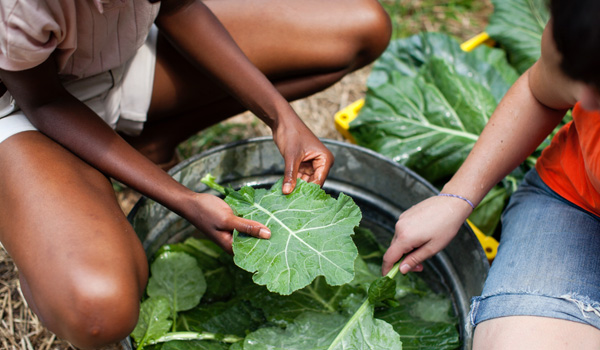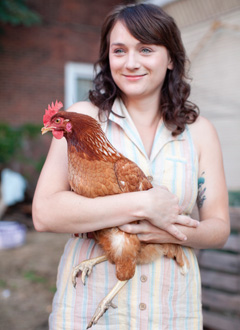 story by ariela rose | photos by emily wren“Kids will knock on our door and ask for collards for their grandmum,” says Emily Wren, one of six members of Mitten, a cooperative house of twentysomething coeds that runs an urban farming venture in Southwest Philadelphia known as Pocket Farm. What began three years ago as a household garden to grow food for Mitten and a neighboring house has quite literally blossomed into a community effort. When neighbors began noticing the vibrant colors and scents of fresh veggies, requests for produce and farming education began pouring in.
story by ariela rose | photos by emily wren“Kids will knock on our door and ask for collards for their grandmum,” says Emily Wren, one of six members of Mitten, a cooperative house of twentysomething coeds that runs an urban farming venture in Southwest Philadelphia known as Pocket Farm. What began three years ago as a household garden to grow food for Mitten and a neighboring house has quite literally blossomed into a community effort. When neighbors began noticing the vibrant colors and scents of fresh veggies, requests for produce and farming education began pouring in.
The garden needed to grow, and fast.
 Pocket Farm’s transition from garden to full-fledged farm was made possible by a grant from the Pennsylvania Horticultural Society’s (PHS) City Harvest Growers Alliance. The program seeks to expand the amount of locally grown produce in Philadelphia’s neighborhoods by assisting home gardeners in turning simple backyard projects into bountiful, community-oriented farms. Soil, seeds and wood for constructing raised beds and trellises were all provided by the grant, along with access to plant starts in a greenhouse at Weaver’s Way Co-op Farm and twice-yearly harvest workshops where novice growers can pickup valuable farming skills.
Pocket Farm’s transition from garden to full-fledged farm was made possible by a grant from the Pennsylvania Horticultural Society’s (PHS) City Harvest Growers Alliance. The program seeks to expand the amount of locally grown produce in Philadelphia’s neighborhoods by assisting home gardeners in turning simple backyard projects into bountiful, community-oriented farms. Soil, seeds and wood for constructing raised beds and trellises were all provided by the grant, along with access to plant starts in a greenhouse at Weaver’s Way Co-op Farm and twice-yearly harvest workshops where novice growers can pickup valuable farming skills.
“It’s a learning process for a lot of us,” says Wren. “We all consider gardening a passion, but none of us has ever done it professionally.”
Even so, the bounty of vegetables and fruit currently growing on the 50-by-100-foot plot are testament to the fact that PHS’s grant is paying off in leaps and bounds. Hefty heirloom tomatoes, peppers, raspberries, okra, collards, kale and cucumbers are currently all ripe for the plucking from the farm’s eight raised beds; a diverse offering inspired by the tastes of Mitten’s members, seeds from PHS, and passionate requests from friends and neighbors.
“Cucumbers are huge with the kids in this neighborhood,” shares Wren with a laugh. “They love eating them with salt. It’s great to just hand these kids fresh vegetables through the fence.”
 The diversity of requests and offerings also reveals a cultural exchange via vegetables. Members of the neighborhood are big on collards, okra and kale, but Wren also shares the tale of one neighbor’s first taste of “exotic” arugula that sparked a love affair with the peppery greens. The farm’s weekly Monday evening farmstand offers an opportunity for community members to taste a plethora of both novel and familiar foods by keeping prices at $1 or $2 per bunch. The stand’s hours (6-8 p.m.) are scrawled on a chalkboard dangling beside the gated entrance, along with the dates and times of upcoming workdays.
The diversity of requests and offerings also reveals a cultural exchange via vegetables. Members of the neighborhood are big on collards, okra and kale, but Wren also shares the tale of one neighbor’s first taste of “exotic” arugula that sparked a love affair with the peppery greens. The farm’s weekly Monday evening farmstand offers an opportunity for community members to taste a plethora of both novel and familiar foods by keeping prices at $1 or $2 per bunch. The stand’s hours (6-8 p.m.) are scrawled on a chalkboard dangling beside the gated entrance, along with the dates and times of upcoming workdays.
Workdays also offer volunteers and neighborhood folk a chance to taste the fruits of the Mitten’s labor of love. While the number of volunteers varies from week to week and, as Wren explains, is dependent on the work itself (“planting is more fun than weeding”), both friends and neighbors arrive at the farm’s gate eager to get their hands dirty. Plus, a couple hours of work also offers attendees inside information on the household’s popular parties.
Each year, Mitten hosts a Halloween cover band concert and a glittery, glamorous drag show known as Miss West Philly Fabulous. This July, the group held a garden party to raise funds for Pocket, complete with local performers, a hula-hoop contest, photo and kissing booths, and fare prepared using ingredients grown on the farm.
 Despite the groundswell of public appeal Pocket has garnered in its brief existence, the folks at Mitten remain dedicated to small-scale, chemical-free and community-based farming.
Despite the groundswell of public appeal Pocket has garnered in its brief existence, the folks at Mitten remain dedicated to small-scale, chemical-free and community-based farming.
“I think we’ll just keep going at this pace,” says Wren, nonchalantly. “[We’ll] just be a place to grow organic produce for the neighborhood.”
To learn more about Pocket Farm, visit its Facebook page; for more information on PHS’s City Harvest Growers Alliance grant, visit pennsylvaniahorticulturalsociety.org/phlgreen/city-harvest.html



